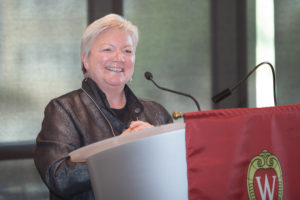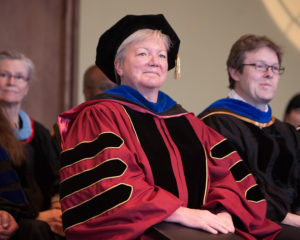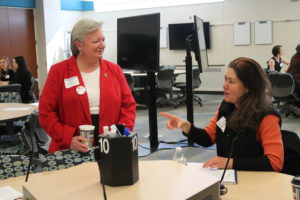Jeanette Roberts becomes the eighth AAAS Fellow in SoP history
By David Steinkraus
The red sweatshirt gives Jeanette Roberts away as she walks into a Monona coffee shop. It is not the red of Wisconsin where she was dean of the UW–Madison School of Pharmacy for 11 years and remains a professor in the Pharmaceutical Sciences Division. It is a worn red sweatshirt from her alma mater, Albright College, in Reading, Pennsylvania.
From that beginning, Roberts followed a career that took her to Minnesota, New Mexico, Utah, and finally to Wisconsin. Along the way she studied the applications of chemistry to medicine, helped shape the careers of graduate students, and helped guide the School of Pharmacy.
Soon her résumé will contain another achievement, and an uncommon one, for Roberts has been named a fellow of the American Association for the Advancement of Science, the world’s largest general scientific society.
AAAS Fellow
Fellows have been chosen by the association since 1874 and are selected based on extraordinary contributions. In the case of Roberts, it is for her distinguished research in chemoprevention and chemoprotection, protecting the body from toxic agents or situations, and possibly from cancer, her long-time service to AAAS, and her invaluable leadership as dean of the UW–Madison School of Pharmacy from 2003-2014.

When she accepts the honor at the association’s annual meeting in Austin, Texas, in February 2018, she will join such notable scientists as Thomas Edison, anthropologist Margaret Mead who provided insights on how culture shapes societies, and biologist James Watson who was one of the people to determine the structure of DNA.
“Recognition like this from your peers is always a great honor,” Roberts says. “I’m so proud to join the ranks of AAAS Fellows from the University of Wisconsin–Madison and our fabulous School of Pharmacy. It’s truly about standing on the shoulders of giants.”
Roberts is the eighth School of Pharmacy faculty member to receive this honor and the fifth SoP professor recognized in the pharmaceutical sciences section. The first was Edward Kremers in 1901 in chemistry; the last was Joseph Robinson in 1990 in pharmaceutical sciences. On campus, she is among just four other University of Wisconsin–Madison professors elected as AAAS Fellows this year.
Magic molecule
Roberts came to Madison in 2003 as dean of the School of Pharmacy after a 15-year career teaching and doing research in medicinal chemistry at the University of Utah. As Roberts defines it, medicinal chemistry is the ability to design and synthesize potential new drug molecules based on deep knowledge of a biochemical process in the body. To put it another way, the medicinal chemist not only has the ability to chemically create an interesting molecule but also knows why to create that particular molecule.
“The magic of glutathione is that it is not only involved in acetaminophen detoxification but in virtually everything.”
–Jeanette Roberts
Starting at the University of Minnesota, where she earned her Ph.D., much of her research work revolved around a single molecule called glutathione. In the body it acts as a protective agent, dismantling molecules that would otherwise be toxic as well as protecting cells from oxidative damage. For example, you have probably seen warnings about consuming no more than 4,000 milligrams of acetaminophen (Tylenol) per day. This is due to toxicity to the liver at high levels. Glutathione clears acetaminophen from the body. Consume too much acetaminophen, and you use up your body’s store of glutathione, which leaves cells vulnerable to damage.
“The magic of glutathione is that it is not only involved in acetaminophen detoxification but in virtually everything. You can also impact any problem that comes from free-radical toxicity, for example,” she says.
Roberts focused on maintaining the body’s supply of glutathione. It is composed of three amino acids: glutamate, cysteine, and glycine. In the body, cysteine is in short supply, so the amount present controls on how quickly glutathione reserves are rebuilt.
She worked to create a prodrug of cysteine, which is a molecule that becomes an active drug once it is broken into pieces by the body. Her prodrug releases cysteine and supports the production of glutathione in order to protect the body from toxic effects.
“I can envision using our prodrug of cysteine (RiboCeine) in many, many situations to relieve toxic stress. It can only be a good thing!,” Roberts says. “RiboCeine is now a commercial product on the dietary supplement market.”
People even talk about using RiboCeine to reduce the consequences of aging because some of the damage that occurs to DNA over time is caused by free radicals. As she talks, Roberts cups her hands in front of her as if she is holding and manipulating a glutathione molecule.
New job, new opportunity
She transitioned into academic leadership when she came to Madison in 2003 as dean. Continuing her research proved challenging. It was too difficult to move her lab and restart her work. She misses the thrill of finding insights, and she misses the deep connection that comes from mentoring graduate students. She misses pushing the boundaries of what is known. Now she leaves that to others.

“One of the strengths of our School here is the faculty are creating the drugs that the pharmacists will work with in the future,” says Roberts.
Instead her position as dean offered its own rewards. “Sometimes you have to stop doing one thing to do another thing,” she says.
Two achievements at the School of Pharmacy especially please Roberts. One is the expansion of global health and international clerkship opportunities, many facilitated by alumni, in the PharmD program. Dozens of pharmacy students have taken advantage of the chance to go to another country for a clinical rotation of six to eight weeks as part of the International Advanced Pharmacy Practice Experiences, and starting about three years ago, the School added post-graduate global health opportunities as well.
“A well-rounded education must include getting out of your comfort zone and your own backyard,” says Roberts. “These international visits allow our students to get a view of other cultures, other systems. And it always produces knowledge that can be brought home to be applied to local situations. This work epitomizes the Wisconsin Idea to create positive impact for the citizens of Wisconsin and beyond.”
Another achievement is forming a partnership with St. Vincent de Paul to start the first charitable pharmacy in the state that provides free medications to low-income people without health insurance.
“This is one of the best things I’ve ever been involved in,” says Roberts. “The unmet medical need in our community is unacceptable. This is one mechanism to meet the need for medications for our most vulnerable neighbors.”

No end to contributions
Roberts is now the director of the new UW–Madison Center for Interprofessional Practice and Education, which teaches students from the university’s various health sciences schools together so they will be ready to practice as part of a high-functioning health care team. She continues to teach, but soon she plans to again give up one thing to do another thing.
On the horizon, she will garden. She will stop reading technical literature and again read for pleasure. She will volunteer, but volunteering in this case means helping free medical clinics and pharmacies around the state secure a source of medications for their impoverished patients in partnership with the Dispensary of Hope in Nashville, Tennessee.
In other words, Jeanette Roberts’ education was not a narrow career specialty. It was a door to an array of ways to contribute to the world, and it is a door she is not about to close.